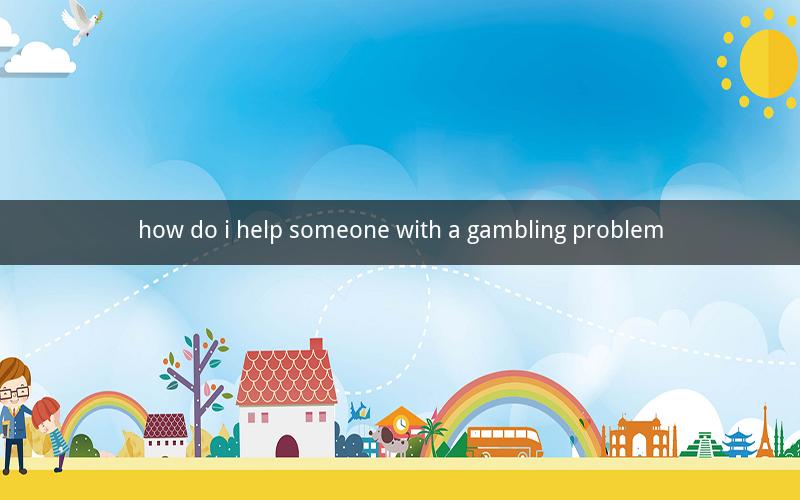
Table of Contents
1. Understanding the Problem
2. Identifying a Gambling Problem
3. Communicating with the Gambler
4. Encouraging Professional Help
5. Setting Boundaries and Support Systems
6. Financial Management
7. Legal and Ethical Considerations
8. Coping with Emotional and Relational Impact
9. Long-Term Support and Recovery
10. Resources and Additional Information
---
1. Understanding the Problem
Gambling addiction is a complex issue that affects individuals, families, and communities. To help someone with a gambling problem, it is crucial to have a clear understanding of the nature of the addiction and its impact on the person's life.
2. Identifying a Gambling Problem
Recognizing the signs of a gambling problem is the first step in providing assistance. Look for behaviors such as secretive behavior, financial strain, neglect of responsibilities, and an increasing need to gamble to relieve stress or negative emotions.
3. Communicating with the Gambler
Approach the conversation with empathy and without judgment. Use "I" statements to express your concerns and feelings. Encourage the person to open up about their struggles and listen actively without interrupting.
4. Encouraging Professional Help
Suggest seeking help from a professional therapist or counselor specializing in gambling addiction. Offer to accompany them to appointments and provide ongoing support throughout the process.
5. Setting Boundaries and Support Systems
Establish clear boundaries to protect yourself from financial and emotional harm. Create a support system that includes friends, family, and support groups dedicated to helping those with gambling problems.
6. Financial Management
Assist the individual in taking control of their finances. This may involve setting up a budget, freezing credit cards, or seeking the help of a financial advisor. Encourage them to seek financial counseling if necessary.
7. Legal and Ethical Considerations
Understand the legal implications of gambling addiction and the rights of both the individual and any affected parties. Seek guidance from legal professionals if necessary.
8. Coping with Emotional and Relational Impact
Gambling addiction can strain relationships and cause emotional distress. Learn healthy coping strategies to manage these challenges, such as mindfulness, exercise, and engaging in hobbies.
9. Long-Term Support and Recovery
Recovery from a gambling addiction is a long-term process. Encourage the individual to stay committed to their treatment plan and continue seeking support from friends, family, and support groups.
10. Resources and Additional Information
Provide the person with access to resources such as hotlines, websites, and literature on gambling addiction. Encourage them to explore these resources for additional information and support.
---
Additional Information
For those seeking to help someone with a gambling problem, the following resources and information can be invaluable:
- National Council on Problem Gambling Helpline: 1-800-522-4700
- Gamblers Anonymous: www.gamblersanonymous.org
- SMART Recovery: www.smartrecovery.org
- Financial Counseling Services: Contact local credit counseling agencies for assistance with financial management.
Questions and Answers
1. Q: What are the signs of a gambling problem?
A: Signs include secretive behavior, financial strain, neglect of responsibilities, and an increasing need to gamble.
2. Q: How can I communicate with someone who has a gambling problem?
A: Approach the conversation with empathy and use "I" statements to express your concerns.
3. Q: Should I confront the gambler about their problem?
A: Yes, but do so with care and understanding to avoid causing further distress.
4. Q: Can I help someone with a gambling problem on my own?
A: While you can provide support, it is important to encourage the individual to seek professional help.
5. Q: How can I help someone manage their finances?
A: Set up a budget, freeze credit cards, and seek financial counseling if necessary.
6. Q: Are there legal implications of gambling addiction?
A: Yes, understanding the legal implications can help you provide appropriate support.
7. Q: What is the role of support groups in recovery?
A: Support groups provide a community of individuals who understand the challenges of gambling addiction and can offer encouragement and guidance.
8. Q: How can I cope with the emotional impact of someone's gambling addiction?
A: Engage in healthy coping strategies such as mindfulness, exercise, and hobbies.
9. Q: What resources are available for someone with a gambling problem?
A: Resources include hotlines, websites, and literature on gambling addiction, as well as support groups and financial counseling services.
10. Q: How can I ensure long-term support for someone with a gambling problem?
A: Encourage the individual to stay committed to their treatment plan and continue seeking support from friends, family, and support groups.